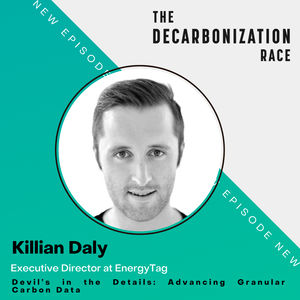
The Decarbonization Race
Lincoln Payton
Devil's in the Details: Advancing Granular Carbon Data with EnergyTag's Killian Daly
DEC 4, 202347 MIN

Devil's in the Details: Advancing Granular Carbon Data with EnergyTag's Killian Daly
DEC 4, 202347 MIN
Description
Decarbonization has diversified from simply vanilla to 31 flavors, where a range of goals and strategies are being adopted as companies work to reduce carbon emissions and other environmental impacts. One key strategy that's emerged has been time-matched procurement of electricity, ensuring that the electricity that's sourced corresponds to when and how much electricity is used onsite. Granular energy attribute certificates (EACs), which add transparency by including information on where and when energy is sourced, are crucial to delivering 24/7 carbon-free energy matched on the hour. On this episode, host Lincoln Peyton talks with EnergyTag Executive Director Killian Daly about how the organization is leading the charge for granular certificates, including advising governments around the world on their use and how they can ensure commodities like hydrogen are produced sustainably. They also discuss the complex world of voluntary standards, market impacts, policy implementation, and the ambitious mission of EnergyTag, which is backed by big names like Google and Microsoft. As EnergyTag champions global adoption of more granular carbon accounting standards, Killian will also shines a light on his role in harmonizing these efforts through leading the Carbon Data Specification initiative at the Linux Foundation. Key Takeaways: Granular data is key to transparency and accountability: by supplying information on when energy is generated, granular data enables organizations to better match the energy they source with consumption, better ensuring companies decarbonization efforts' deliver the desired impacts. Education leads to action: regulatory measures, such as the push for renewable hydrogen in Europe, will help suppliers shape how they source energy and produce commodities like hydrogen, chemicals and steel. Clear definitions of 'green' and enforceable standards can safeguard against inefficacy or greenwashing of products. Strategic advantages of sustainable practices: There is a competitive edge companies gain by committing to sustainable practices — from price stability in energy markets to consumer trust in green certification. Going beyond the rhetoric of corporate responsibility, Killian articulates the tangible benefits of embedding sustainability into business models. Resources: Learn more about EnergyTag: https://energytag.org/ Case studies of granular certificate use: https://energytag.org/case_studies/ The Granular Certificate Standard: https://energytag.org/standards/ Canary Media's series on the green hydrogen debate: https://www.canarymedia.com/articles/hydrogen/the-great-green-hydrogen-battle